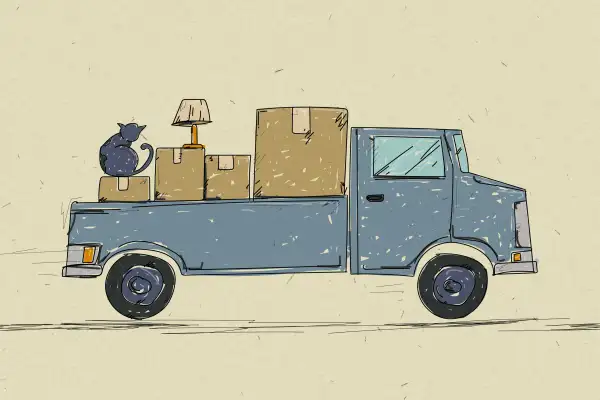10 Moving Tips

Moving is probably one of Americans' most dreaded tasks, but the vast majority of people will relocate at least a few times during their lifetime.
Thankfully, there are strategies you can use to make the process easier. Here are 10 moving tips that will help minimize the hassles while you shift to a new place to live:
1. Do your research and pick a legitimate moving company
A lot of people choose to move using their own vehicle or rent a truck to save a little extra cash. But if you have many items — especially heavy ones — hiring a professional moving company may be the better and more convenient choice.
Still, you don’t want to hand over your precious belongings to just anyone, which is why we recommend you do the following when weighing your options.
Watch out for red flags
It just takes a quick Google search with the phrase “moving company scams” for hundreds of results to pop up.
According to the Federal Motor Carrier Safety Association (FMCSA), one of the agencies that regulate movers in the U.S., these are some of the telltale signs your mover is fraudulent:
- Gives you an estimate without an onsite inspection
- Demands cash or a large deposit before the move
- Lacks a local physical address
- Answers the telephone with a generic message instead of the company name
- Cannot provide information about its insurance policy
- You can’t find its registration number online, or they cannot provide it when you ask
- Doesn’t give you a written copy of your estimate
- Says it will determine the charges after loading
If you spot any of these, the best thing to do is stay away and look for other alternatives. Oftentimes, dishonest movers will demand more money before they agree to deliver or unload your belongings.
Request a binding estimate
There are two types of estimates that legitimate movers will offer: non-binding and binding. Moving companies offer one or the other, based on how much your items weigh and how many movers and vehicles are needed to relocate your belongings. The difference is that, with a non-binding estimate, you may end up paying more if your items weigh more than was originally estimated.
You should always aim to do business with a company that offers binding estimates, as these types of agreements guarantee that you won’t be charged more than what you were initially quoted.
Verify the company’s rating with the Better Business Bureau
The Better Business Bureau (BBB) is an organization that accredits businesses based on their ability to offer services as advertised and their commitment to effectively address and resolve customer complaints.
Companies with ratings of A or above are generally considered more reputable. Besides providing ratings, the BBB also has a comment section in which you can view customer complaints and the companies’ responses. This information can give you additional insights into whether or not you want to do business with a particular company.
2. Make a moving day bag
In case you can't unload everything on the day of your move, take the following important items in a separate carry-on bag:
- Personal IDs
- Spare cash
- Records of all your belongings (including their value)
- A copy of your moving contract
- Important documents, like your new property’s contract
- Spare keys
- First aid kit (you never know what can happen!)
- An extra set of clothes
- Snacks
- Toilet paper
- Electronics
- Chargers
3. Finish packing before the move
Packing procrastination can lead to potential mistakes like leaving important items or documents behind, not packing fragile items properly and overstuffing boxes to their breaking point.
If you have professional movers, this part may be easier as they’ll do most of the hard work for you, but still, here are some tips to amp up your packing game:
Packing Tips
Declutter before you pack
Before you move, take the time to identify things you don’t need to take to your new place. If you’re DIYing your move, this will help you save money on packing supplies and make packing easier.
If you’re hiring a moving company, reducing clutter could help you save hundreds of dollars. Moving companies usually charge by the hour, the weight of the items and how many movers or trucks are needed to get the job done.
When decluttering, make sure to divide the items into four categories: keep, toss, sell or donate. You can use storage bins or plastic bags to help you keep things organized.
Have a moving checklist
Color-code boxes or label them so you know what’s in them. Additionally, take inventory of what is going into which truck and, if possible, take pictures of what’s inside each box. These steps will streamline unpacking once your items arrive at their final destination.
Stock up on supplies — the smart way
Even if you hire professional movers, you’ll probably need some supplies of your own, like packing tape (lots of it) and boxes.
Sure, you can buy cardboard boxes at an office supply or hardware store, but most local grocery stores will have these available for you at no cost. If you're concerned about the environmental impact of all those boxes — or if you'd just rather not deal with all that cardboard after you unpack — you can also rent reusable moving crates that will be picked up after you're settled.
4. Have a moving truck loading plan
Start by loading the heaviest items — such as your fridge, sofa and dressers — first, placing them as close as possible to the vehicle handling the moving. That way, these will act as a sturdy base to protect other belongings.
Next, stack up medium-weight objects, like tables, chairs and heavy boxes, and place lighter items on top of them.
Finally, fill up any empty spaces with bed sheets, blankets and other soft items to provide padding that can minimize movement inside the truck.
5. Get a shoulder dolly
Fun fact: The Incredible Hulk can lift over 100 tons without breaking a sweat — but you can’t.
A shoulder dolly is a two-person system consisting of two harnesses connected by a lifting strap with tension metal buckles. They are used by professional movers to reduce back, shoulder, arm and hand strain.
With a shoulder dolly, you and your companion can safely lift up objects weighing up to 800 pounds, as long as their width doesn’t exceed nine feet. You can buy one online, at local hardware stores or major hardware chains for about $40.
6. Use blankets to protect sensitive furniture
Besides using blankets to fill up empty spaces in the truck, they can be used to protect fragile or delicate items, like glass tables, mirrors, paintings and ceramics.
They also come in handy to protect wooden furniture from scratches and minor dents. Although any type of blanket or cloth will do, quilts and comforters should be your first choice, as they provide an additional layer of padding.
7. Reserve a spot for your moving truck
Some cities, including Philadelphia and Boston, require you to have a moving permit to park and unload your truck, especially in downtown areas. You’ll also need to apply for a moving permit if you live in an apartment building without a loading dock. Failing to do so could cost you over $100 in fines.
Moving permits can cost between $20 to $110 per day, depending on your city and whether the parking space you’re using is metered. You typically must request your permit at least two weeks in advance and can apply for it online by visiting your city’s website.
Once your permit is approved, you’ll receive a “No Parking” sign you can place at both ends of the space where your truck will be parked. Make sure, then, that you get the truck’s dimensions beforehand from the moving company or rental agency.
If your city doesn’t require a moving permit, ask your landlord or homeowners association if there are rules regarding parking spaces for trucks.
8. Avoid peak moving times
If you’re hiring a moving company, timing your move can save you a lot of money, as professional movers charge more during busier seasons.
Peak moving months run from mid-April to September, with July and August being the busiest, as summer is the most comfortable season to move (kids are out of school, people are on vacation, the weather is right, etc.).
Fridays and the weekend are the busiest and most expensive days to move, while weekdays, especially Mondays and Tuesdays, tend to be the cheapest.
9. Check-in with the IRS
Not all postal offices forward government checks. So make sure you notify both the USPS and the IRS that you’ve moved, particularly if you’re waiting for your tax refund to be mailed to you.
You can do this by filling out Form 8822 and sending it by mail or by calling the IRS customer support center.
10. Consider insurance coverage
Homeowners insurance policies won’t cover your belongings while you move. Renters insurance, on the other hand, may cover property stolen during a move and damages caused by covered perils.
This is something to consider, especially if you’re not planning to use a truck rental service or a moving company — either of which may provide insurance. However, keep in mind that personal property coverage limits vary by insurer and high-value items may require additional protection in the form of floaters or scheduled personal property coverage.
Truck rental services offer coverage for the vehicle, passengers and cargo, but you’ll have to pay a little extra for it.
Moving companies also offer three types of insurance coverage options:
- Released value protection: the most basic type of protection offered at no additional cost. However, if something happens to any of your belongings, you’ll typically get 60 cents per pound per article.
- Full value protection: has an added cost, with the deductible varying depending on the company. With this type of coverage, if any of your items are lost or damaged during the move, the company must replace them, reimburse you or pay for any needed repairs.
- Separate liability coverage: used to complement released value. If you choose to purchase it, the mover is still responsible for paying you 60 cents per pound per article, but their insurer has to cover the rest of the loss up to your policy’s limit.
Summary of Money’s Moving Tips
- DIY-ing your move can be cheaper than hiring professional movers, but if you have a lot of stuff or heavy items, using a moving company may be a better choice.
- If you hire professional movers, you’ll get additional protection for your belongings that you won’t get if you use your own vehicle.
- Since there are many moving scams out there, make sure to research the company’s reputation before signing your name on the dotted line.
- Choose a company that offers binding estimates, as this serves as sort of a “price guarantee.”
- If you choose to move without the help of professional movers, be sure to stock up on sufficient packing supplies and obtain proper moving equipment, such as dollies and blankets.
- Before you pack, purge any items you no longer need to save money and time.
- Some cities require moving permits for you to unload your belongings, especially in downtown areas. Make sure you research the need for these at least a few weeks in advance of your move.
- Notify the IRS of any changes in your address, as some postal offices don’t forward government checks.


